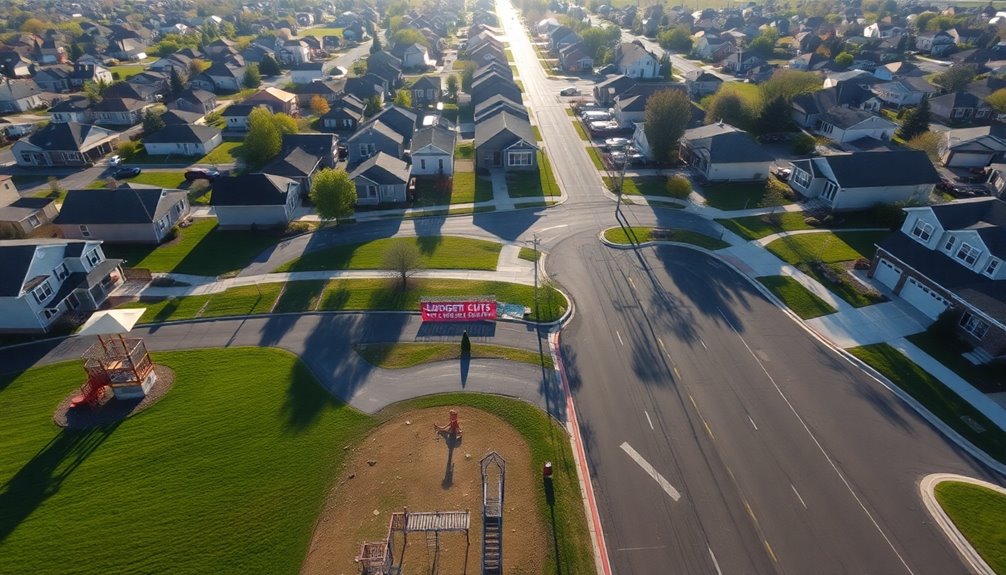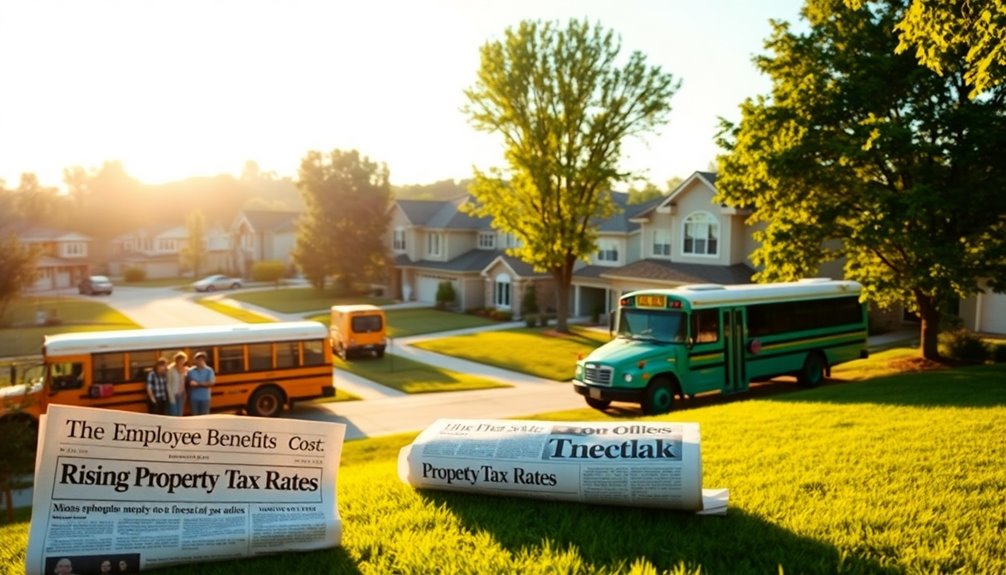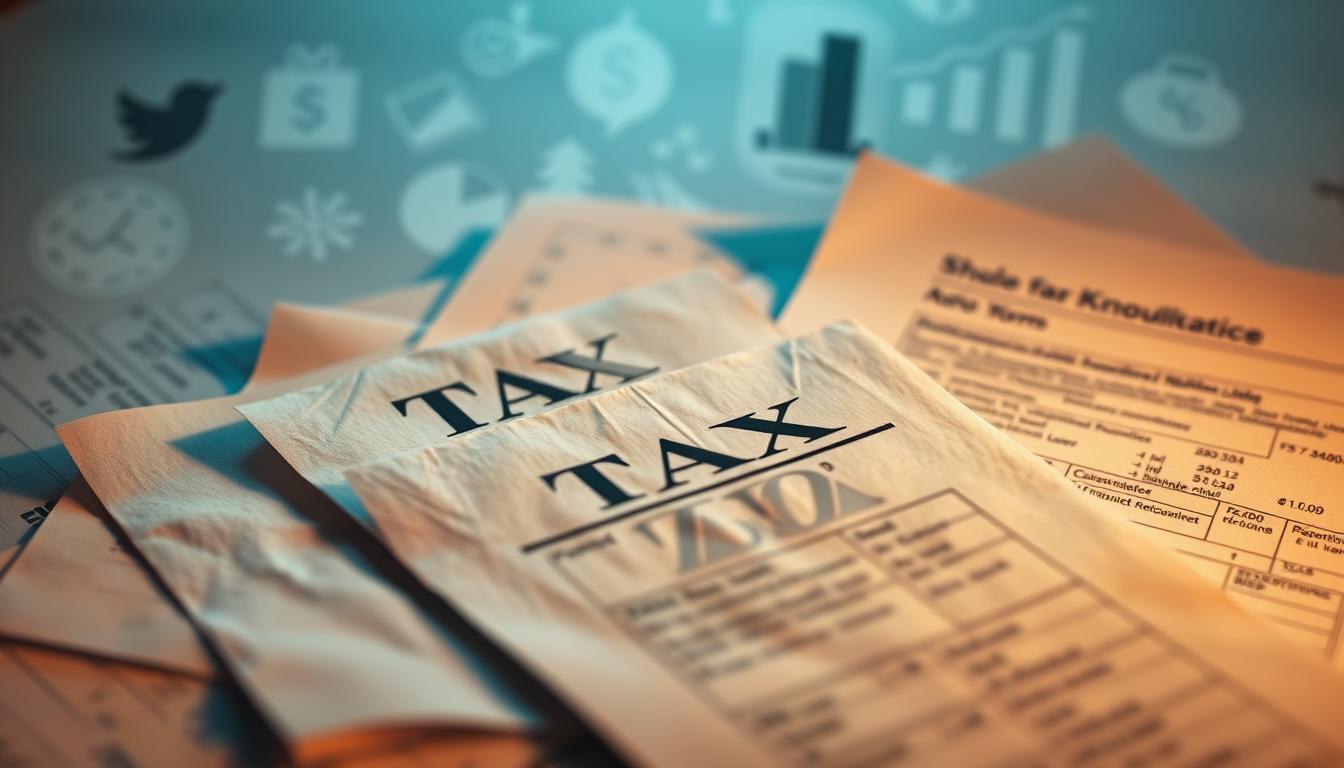Property taxes go up for several reasons that directly affect your wallet. Local governments often raise tax rates to meet increased budget demands, especially for schools and infrastructure projects. If your property's value rises due to upgrades or a booming real estate market, that can also trigger higher taxes. Additionally, rising costs for local services and employee benefits put pressure on budgets, which local governments may pass on to you through increased taxes. Community initiatives can add further tax burdens. Understanding these factors can help you anticipate changes in your property tax bills and prepare accordingly.
Key Takeaways
- Increased local government spending on essential services, such as roads and schools, often leads to higher property tax rates.
- Rising property values from home improvements and market demand result in higher tax assessments for homeowners.
- Employee benefit costs for local governments can lead to increased property taxes as budget strains mount.
- Voter-approved initiatives for community projects can add additional tax levies, raising overall property tax bills.
- State-imposed fiscal restrictions may limit local tax increases, yet rising service demands can still drive up property taxes.
Tax Rate Increases

As local governments strive to meet rising budget demands, tax rate increases often become necessary to cover the costs. You may notice that local governments are ramping up spending on essential projects like new roads and schools. This increased spending often translates into higher property tax rates, as budgets swell due to growing labor and materials costs.
When local budgets fall short after factoring in other revenues, raising tax rates becomes a common solution to balance the books.
Moreover, voter-approved initiatives, such as technology upgrades in schools, can add additional burdens to your property tax bill. Even state laws can complicate matters; for instance, Texas imposes a strict cap on annual property tax increases, which can limit how much taxes can rise without voter approval.
However, if local governing bodies decide to boost budgets, you might find that your tax rates go up despite these caps. Property value reassessments can also lead to increased tax bills, as local assessors evaluate and adjust property values based on market trends.
In essence, as local governments grapple with budgetary challenges, tax rate increases tend to follow suit, impacting your financial obligations as a property owner. Understanding these dynamics can help you navigate the complexities of property taxes in your area.
Rising Property Values

Tax rate increases aren't the only reason your property taxes might rise; rising property values play a significant role too. When you make home improvements, for instance, the value of your property can increase, leading to higher taxes. Additionally, recent home sales in your area often serve as benchmarks for appraisers. If homes nearby are selling for more, your property's assessed value might increase too.
Market conditions also impact your taxes. A decrease in housing supply or an increase in demand can drive up property values. Economic growth, with more jobs and better salaries, can make homes more affordable, further pushing up prices. Furthermore, increased buyer activity due to lower mortgage rates can lead to higher property values, influencing tax assessments. As a result, understanding market trends is essential for homeowners to anticipate changes in their property taxes.
Even changes in zoning laws can influence property values, leading to potential tax hikes.
Local governments reassess property values periodically, and these assessments determine your tax bill. Inflation also plays a part, as the rising costs of materials can increase property values over time.
Lastly, if a natural disaster reduces housing supply in your area, the value of your unaffected property may rise, resulting in higher taxes. Understanding these factors can help you navigate your property tax situation more effectively.
Budget Shortfalls

Budget shortfalls can create significant challenges for local governments, impacting the essential services you rely on. When states like California face revenue shortfalls, local property tax allocations get squeezed, making it harder for municipalities to fund schools, public safety, and other vital services. As economic conditions fluctuate, the need for advance directives becomes increasingly important to ensure that essential services, including healthcare, can be maintained even as budgets tighten.
As state budgets tighten, you may notice cuts in local spending, and that can directly affect how your property taxes are used. In response to these budget constraints, local governments might adjust their budgets and seek alternative revenue streams. However, they often encounter state-imposed limits on property tax increases, further complicating their financial situations. This scenario can lead to reliance on reserves, which, while helpful, aren't a sustainable long-term solution.
Moreover, economic downturns can exacerbate these problems, reducing state revenues and affecting property tax collections. As local governments grapple with these challenges, you might see fluctuations in your property tax bills due to legislative changes or voter-approved initiatives, which can contribute to budget shortfalls if not managed effectively. Ultimately, these financial pressures can hinder the capacity of local governments to deliver the services you depend on.
In fact, property taxes provide a more stable revenue source for local governments, encouraging investment in real estate and infrastructure, which is crucial during times of financial strain.
Employee Benefit Costs

Rising costs associated with employee benefits can further strain local budgets already feeling the pressure from budget shortfalls. One significant factor is the taxation of employer-provided housing, which is generally considered a taxable fringe benefit. When employers provide housing, its fair market value (FMV) gets added to employees' wages, impacting both federal and state tax obligations.
You mightn't realize that this benefit is also subject to Social Security and Medicare taxes, increasing the overall cost for employers. Additionally, taxability varies based on the nature of the housing provided, meaning not all employer-paid housing will have the same financial implications.
In California, the situation is even more complex. Employers must deal with state-specific taxes, including state unemployment insurance and Employment Training Tax on the housing value. This can add significant costs that local governments must manage.
Furthermore, employers face legal requirements, including signed landlord-tenant agreements and compliance with state tenancy laws, to avoid penalties.
All these factors contribute to higher employee benefit costs, which can lead to increased property taxes as local governments seek to cover budget shortfalls. Ultimately, the financial burden of providing these benefits can trickle down, impacting everyone in the community.
Property Improvements

When you make property improvements, you're likely to see an increase in your property's assessed value, which can lead to higher property taxes.
Adding square footage, such as a new bedroom or expanded living area, often triggers a reassessment. Converting an attic or basement into livable space also boosts your home's value, making it a potential tax concern.
Upgrading your kitchen with high-end finishes or remodeling bathrooms can significantly enhance your home's assessed value. Property assessors consider major improvements in tax evaluations, so it's essential to keep this in mind.
Even small renovations, like installing a new fireplace or paving a dirt driveway, can contribute to increased taxes. If you add a sunroom or an in-ground swimming pool, expect a reassessment as these are considered major enhancements.
Moreover, any project costing over $5,000 is likely to trigger a tax reassessment, so be mindful of the costs involved.
Detached structures, like garages or sheds requiring permits, can also impact your property taxes.
Essentially, any improvements that enhance functional or usable space tend to lead to higher property taxes, so plan your projects accordingly to understand their potential financial implications.
Local Tax Policies

Property improvements often lead to increased assessed values, but local tax policies also play a significant role in determining your property tax bill. State and local statutes define how your property's value is assessed and taxed. In some states, there are limits on annual value increases, regardless of market trends. Reassessments may happen every few years, and these assessments can be influenced by various indices or estimates. Additionally, property tax assessments can vary significantly based on the method used to determine value, impacting overall tax bills.
Voter-approved initiatives can further impact your tax bill, as residents may agree to increase taxes for local projects like school upgrades or infrastructure improvements. These initiatives often require additional levies, driving up your property taxes.
Local government budget appropriations are crucial, too. Many local services, especially from school districts, rely heavily on property tax revenues. If budgets increase to cover rising costs, you might see higher tax levies.
Lastly, state-imposed fiscal restrictions can limit how much local governments can raise through property taxes. While these limits aim to control tax growth, they can also complicate local fiscal stability, making it harder for governments to adapt to rising service demands or economic changes.
Frequently Asked Questions
How Can I Contest My Property Tax Assessment?
To contest your property tax assessment, start with an informal appeal.
Contact your local assessor to discuss any discrepancies. If needed, follow up with a formal appeal by filing a written complaint with the county board of review.
Gather evidence, like recent sale prices or appraisals of similar properties, to support your case.
Ensure you meet all deadlines and present your evidence clearly to increase your chances of a successful appeal.
What Should I Do if I Cannot Pay My Property Taxes?
If you can't pay your property taxes, don't panic.
Start by checking if your county offers installment plans or split payment options to ease the burden.
Consider applying for a deferral if you're eligible, especially if you're over 65 or have a disability.
Reach out to your local tax office to discuss potential exemptions or assistance programs.
It's crucial to communicate with officials before the deadline to avoid penalties and find a suitable solution.
Are There Any Exemptions for Senior Citizens or Veterans?
Yes, there are exemptions for senior citizens and veterans.
If you're a senior, check your state's age and income limits to see if you qualify.
For veterans, you'll need to verify your service-related disability and residency.
Both groups can apply through their local tax assessor's office, so gather the necessary documentation, like proof of age or disability, and submit your application on time to take advantage of these tax savings.
How Are Property Taxes Used in My Community?
In your community, property taxes fund essential services like police, fire departments, and schools.
They help maintain local infrastructure, parks, and roads, ensuring your neighborhood stays safe and enjoyable.
Property taxes also support public facilities such as libraries and community centers, enhancing your quality of life.
Additionally, these taxes finance local projects, including water systems and technology upgrades, directly impacting your daily experiences and the overall development of your area.
Can Property Taxes Affect My Home's Resale Value?
Property taxes don't directly affect your home's resale value, but they can influence buyer preferences.
If your property has a lower assessed tax value, potential buyers might find it more appealing since it lowers their monthly expenses.
Market dynamics, like recent neighborhood sales, play a bigger role in determining value.
Additionally, homestead caps can provide some stability against market fluctuations, indirectly impacting how buyers view your property's worth.
Conclusion
In conclusion, property taxes can go up for several reasons, like tax rate increases and rising property values. When local governments face budget shortfalls or rising employee benefit costs, they often turn to taxpayers for support. If you've made improvements to your property, that can also lead to higher assessments. Staying informed about local tax policies and market trends can help you anticipate changes, so you're better prepared for any increases in your property taxes.









